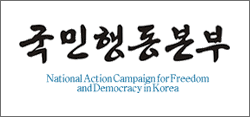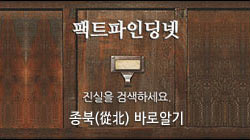注-이 글은 토론방에서 가져온 것이다.
이름:바람부는 날
2003년 2월 9일 일요일
조회: 55회
방미특사단이 갈라놓은 한미동맹관계 (전문)
잘 한다. 선무당, 아마추어들이 곧 나라를 다 말아 먹겠다.
노무현 측 연대 문정인교수는 몇주전 미국에서 미국보러 북미불가침조약을
맺으라고 촉구하더니만, 이번 방미특사단은 확실하게 한미동맹관계를
끝장내려고 작심한 모양이군.
잘한다. 아주 화끈하게 나라를 작살내라!
++++++++++++++++++++++++++++++++++++++++++++++++++++++++++++++++++++++
북한에 관해 갈라진 미국과 남한
위기는 심각해지는데 두 동맹은 다른방향으로 가고 있는 듯.
하와드 W. 프렌치 (뉴욕 타임즈 기자)
토, 2003. 2. 8. 인터내셔날 헤랄드 트리뷴
최근 2개월동안 북한의 지도부는 북한이 핵보유국이 되었다는 결론을 거의 확실히 남기게 될 최종선을 향하는 목록표를 체계적으로 밟아 왔다.
미국이 안전보장에 관한 협상에 동의하지 않을 경우 통제될 수 없는 파국을 경고하던 크리스마스 이브 이래로, 북한의 의도에 관해 의문은 없었다.
북한으로부터 오는 유일한 놀라움은 주의를 끌기 위해 일주일마다 사용되었던 불길한, 협박조의 언어를 고안해내는 기술이었다.
그런데 더욱 놀라운 것은 이 위기와 가장 관련되어 있는 두 나라, 미국과 남한의 행동이었다. 즉 북동아시아의 외교관과 정치분석가들 초청.
북한이 자기의 전략에 대해 강철같은 통제에 집착해 있는 동안, 와싱톤과 그 전통적으로 가까운 동맹국인 남한이 충격에 빠진 것으로 보여지고, 두나라가 심각히 갈라졌고, 핵시계를 거꾸로 되돌리거나 또는 늦출 수 있는 전략이 없다고 이들 전문가들은 말한다.
부시 행정부 내에 북한에 대한 정책을 놓고 여러달 동안 강경론자들과 좀 더 달래는 접근방식을 촉구하는 사람들 사이에 공개된 구분이 있어 왔다고 외교관들과 한반도 전문가들은 말한다.
그러나, 최근 2주동안 파월 국무장관이 국무부가 가난하고 중무장한 나라에 대한 정책을 통제하겠다고 마침내 주장하기 시작했다는 강력한 징표가 나타났다고 많은 사람들이 말한다.
무엇보다도, 와싱톤의 새로운 정책은 북한과의 긴장을 낮추고, 직접대화를 위한 길을 서서히 준비하는 것을 의도한 것이다. 최근에, 부시를 비롯한 미국의 고위관료들은 미국이 북한을 공격할 의사가 없으며, 만약 모든 핵 가동을 검증가능하도록 포기한다면 경제적 협조를 할 준비가 되어 있다고 강조해 왔다.
그런데, 작년에 스테이트 오브 더 유니언 연설에서 부시가 북한을 악의 축이의 한 멤버라고 이름붙인 이후로, 미 행정부는 수요일에 북한에 향해 가장 격한 언어를 사용함으로써 스스로 모순되는 것처럼 보였다. 하원청문회에서, 국방장관 럼스펠드는 북한을 테러리스트정권이라고 불렀고, 이 말은 미국이 이라크전쟁이 일단 끝나면 자기를 공격할 의도라고 믿는 평양의 믿음을 더 강하게 할 뿐이라고 많은 사람들이 말한다.
다음날 나온 매우 이례적 논평에서, 북한 노동당 기관지인 노동신문은 미국의 공격계획을 단호히 경고했다.
“지금까지 미국의 움직임에 있어서 우리는 미제국주의자들이 군사적 모험을 하리라고 예상한다.” 라고 사설은 말했다.
그리고, 논평은 이렇게 덧붙힌다. “미국이 선제공격을 명령할 때까지 우리가 무기를 거두고 한가히 앉아 기다린다고 미국이 생각하는 것은 멍청하다. 우리는 선제공격에는 강력한 반격을 그리고 전면전에는 전면전으로 응답할 것이다.”
베테랑 정보분석가들은 어떤 그림에서 북한언론이 미국의 공격을 예상했는지 알 수가 없다고 말했다.
“국방부 럼스펠드와 존 볼튼이 파월과 국무부를 상대로 한쪽에서 싸우고 있는 첫 장면으로 되돌아 간 것으로 보인다” 라고 인터내셔날 이코노믹스 연구소의 선임연구원인 말커스 노랜드가 말했다.
“북한은 계획을 가지고 앞으로 계속 행군하고 있는데 우리는 정책을 가지고 있는 것으로 보이지 않는다.”라고 말했다.
여러가지로 남한에서의 상황은 와싱톤에서의 표면적인 정책불협화보다도 더 걱정스럽다고 지역전문가들은 말한다.
남한의 퇴임하는 대통령 김대중과 새로 선출된 지도자 노무현 두 사람 다 북한과 화해를 확고히 다짐하고 있어서 평양의 핵무기개발을 끝장내는 것을 목적으로 하는 와싱톤의 어떠한 강압적이거나 군사적 조처는 대신에 50년간의 미국과 남한 사이의 동맹관계를 파괴시킬 수도 있다.
노무현이 지난주 평양과 와싱톤에 보낸 두 특사들의 결과는 어떤 외교관이 말하는 새로 취임하는 정부의 북한에 관한 “낭만적인 비현실감각”을 보여주고 있다고 분석가들은 말한다.
평양으로 간 남한의 특사들은 북한의 지도자인 김정일을 만날 수도 없었다. 김정일은 수도 밖에 나가 있어서 그들을 볼 수 없었다고 설명되었다. 남한은 두 나라 관계를 개선하기 위해 김대중의 소위 햇볕정책 아래 지난 3년동안 식량 등 지원으로 10억달라 이상을 썼다.
그러는 동안, 노무현의 인수팀의 위원들로 구성된 고위 파견단의 지난주 와싱톤 방문은 거의 재앙에 가까운 것으로 널리 묘사되고 있다. 노무현은 노동법 경력을 가진, 국제적 경험은 거의 없는 진보적인 1선 국회의원이다.
미국과 남한 사이의 동맹관계의 균열이 수개월동안 더 벌어져왔지만, 상견례 방문은 와싱톤과 서울 사이의 엄청나게 큰 견해차이 - 특히 북한에 대해서 – 를 더욱 강화시켰다.
인수팀을 위한 사적인 와싱톤 만찬에서, 만약 선택해야만 한다면, 새로운 정부는 북한이 붕괴되는 것을 보는 것보다 북한이 핵무기를 가지는 것을 더 선호한다고 남한의 고위 특사가 말할 때 놀라서 입이 쩍 벌어졌다고 여러명의 미국측 참석자들이 말했다.
노무현의 공식 정책은 북한의 핵무기는 참을 수 없는 것이지만, 고위 보좌관들은 서울은 평양에 대한 어떠한 군사적 행동에 반대할 것이고, 경제적 제재조차도 저지할 것이라는 메시지를 강조했다.
“그들의 반응은 너무나 동떨어져서 모든 다른 행성들로부터 한국인들에 대한 거리보다도 차라리 행성들간의 거리가 더 가까울 것이다” 라고 이름을 밝히지 말라고 요청한 한 만찬 참석자가 말했다. “나는 앞으로의 관계에 있어 큰 문제점이 있다고 느낀다. 노무현과 그의 세대의 최종 목표는 자기 나라를 다시 통일하고 미국을 한반도에서 쫒아내는 것이라고 나는 느꼈다.”라고 말했다.
U.S. and South Korea diverging on North
Allies seem to waver as crisis deepens
By Howard W. French (The New York Times)
Saturday, February 8, 2003
For the last two months, North Korea's leadership has been working its way methodically down a checklist toward a bottom line that almost certainly will leave the conclusion that the country has become a nuclear state.
There has been little mystery about the country's intentions since Christmas Eve, when it warned of an 'uncontrollable catastrophe' unless the United States agreed to negotiate a security pact. The only surprise from North Korea has been the inventiveness of the ominous, often threatening language it has used week after week in the hopes of getting attention.
Far more surprising has been the behavior of the two other countries most concerned by this crisis, the United States and South Korea, say a host of diplomats and political analysts of northeast Asia.
While North Korea has stuck with steely discipline to its strategy, these specialists say that Washington and its traditionally close South Korean ally have appeared paralyzed, badly divided among themselves and lacking a strategy to reverse or even slow the nuclear clock.
Diplomats and Korea experts say that for many months there have been open divisions within the Bush administration over North Korea policy, between 'hard-liners' and those who urge a more conciliatory approach.
Over the last two weeks, however, many say strong signs have begun to emerge that Secretary of State Colin Powell has finally begun to assert State Department control over policy toward the impoverished and heavily armed country.
Above all, the new line from Washington was intended to lower tensions with North Korea, and gradually prepare the way for direct talks. Recently, senior American officials, from Bush himself down, have emphasized that the United States has no intention of attacking North Korea, and is even prepared to reward the country with economic cooperation if it verifiably abandons all of its nuclear operations.
The administration seemed to contradict itself openly again Wednesday, however, with the most inflammatory language used toward North Korea since Bush labeled the country a member of an 'axis of evil' in his State of the Union address last year. Speaking at a committee hearing at the House of Representatives, Defense Secretary Donald Rumsfeld called North Korea a 'terrorist regime,' language that many say will only harden Pyongyang's belief that the United States intends to attack it once any war in Iraq is completed.
In a highly unusual commentary published the next day, the Rodong Sinmun, the newspaper of the ruling North Korean workers' party, flatly warned of American plans to attack.
'In view of the U.S. moves so far we predict that the U.S. imperialists may make such a military adventure,' the editorial stated.
Shortly afterward, the commentary added: 'It is foolish for the U.S. to think that we sit idle with folded arms to wait until it gives orders for a preemptive attack to be started. We will answer a preemptive attack with a powerful counterattack and a total war with a total war.'
Veteran intelligence analysts said they could not recall a formulation in which the North Korea media predicted an American attack.
'It looks like we are back to square one, with Rumsfeld, the Pentagon and John Bolton on one side fighting against Powell and the State Department,' said Marcus Noland, a senior fellow at the Institute for International Economics.
'North Korea keeps marching ahead with its plans, and we don't even appear to have a policy.'
In many ways, regional experts say, the situation in South Korea is even more worrisome than the apparent policy disarray in Washington.
Both South Korea's outgoing president, Kim Dae Jung, and its newly elected leader, Roh Moo Hyun, are so firmly committed to engagement with North Korea that any coercive or military measures by Washington aimed at terminating Pyongyang's nuclear weapons programs could destroy the 50-year-old alliance between the United States and South Korea instead.
Analysts say the results of two special delegations sent last week by Roh, one to Pyongyang and the other to Washington, illustrate what one diplomat called the incoming government's 'romantic funk' over North Korea.
The South's special envoys to Pyongyang were unable to meet the North Korean leader, Kim Jong Il, who, it was explained, was traveling outside of the capital and was unavailable to see them. South Korea has paid over $1 billion in food and other aid to the North over the last three years, under Kim's so-called sunshine policy, in order to improve relations between the two countries.
Meanwhile, the visit to Washington last week of a high-level delegation composed of members of Roh's transition team was widely described as a near disaster. Roh is a liberal one-term legislator with a background in labor law and almost no international experience.
Cracks in the alliance between the United States and South Korea have been widening for months, but the getting-to-know-you trip appears to have reinforced feelings of huge differences between Washington and Seoul, especially on North Korea.
At a private Washington dinner for the transition team, several American participants said mouths dropped when a senior South Korean envoy said that, if it had to choose, the incoming government would prefer that North Korea had nuclear weapons to seeing North Korea collapse.
Roh's stated policy is that nuclear weapons in North Korea would be intolerable, but senior aides reinforced the message that Seoul would oppose any military action against Pyongyang, and would even resist sanctions.
'Their responses were so far out that all the other planets were all closer to each other than they were to any of the Koreans,' said one participant in the dinner who asked not to be named. 'I sense major trouble ahead in the relationship.
The impression I got is that for Roh and his generation, the ultimate goal is to reunite their country and get us off the Peninsula.'













 토론방
토론방







 트위터
트위터 페이스북
페이스북 네이버
네이버



























